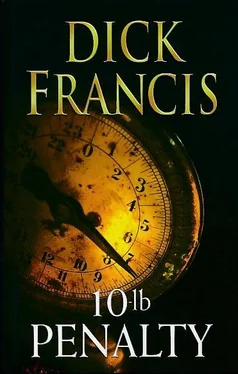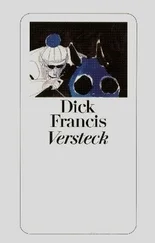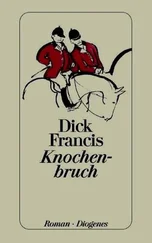Dick Francis - 10 lb Penalty
Здесь есть возможность читать онлайн «Dick Francis - 10 lb Penalty» весь текст электронной книги совершенно бесплатно (целиком полную версию без сокращений). В некоторых случаях можно слушать аудио, скачать через торрент в формате fb2 и присутствует краткое содержание. Город: London, Год выпуска: 1997, ISBN: 1997, Издательство: Michael Joseph, Жанр: Триллер, на английском языке. Описание произведения, (предисловие) а так же отзывы посетителей доступны на портале библиотеки ЛибКат.
- Название:10 lb Penalty
- Автор:
- Издательство:Michael Joseph
- Жанр:
- Год:1997
- Город:London
- ISBN:978-0-7181-4245-2
- Рейтинг книги:3 / 5. Голосов: 1
-
Избранное:Добавить в избранное
- Отзывы:
-
Ваша оценка:
- 60
- 1
- 2
- 3
- 4
- 5
10 lb Penalty: краткое содержание, описание и аннотация
Предлагаем к чтению аннотацию, описание, краткое содержание или предисловие (зависит от того, что написал сам автор книги «10 lb Penalty»). Если вы не нашли необходимую информацию о книге — напишите в комментариях, мы постараемся отыскать её.
10 lb Penalty — читать онлайн бесплатно полную книгу (весь текст) целиком
Ниже представлен текст книги, разбитый по страницам. Система сохранения места последней прочитанной страницы, позволяет с удобством читать онлайн бесплатно книгу «10 lb Penalty», без необходимости каждый раз заново искать на чём Вы остановились. Поставьте закладку, и сможете в любой момент перейти на страницу, на которой закончили чтение.
Интервал:
Закладка:
The prime minister said, “I will take note and remember what you have both said, but at the moment I don’t see any real grounds for action.”
He stood up, indicating that the meeting was over, and shook hands with my father with unabated good nature, and I remembered my father’s teaching on the very first day when I’d driven with him from Brighton to Hoopwestern, that people believe only what they want to believe. It applied, it seemed, even to prime ministers.
After we’d left No. 10 I said glumly to my father, “I did you no good.”
“He had to be told. He had to be warned. Even if it does my career no good, it was the right thing to do.”
My father’s strict sense of right and wrong might destroy him yet, I thought.
Eleven
After Christmas that year several things happened that changed a lot of lives.
First of all, on New Year’s Eve, a wide tongue of freezing air licked down from the Arctic Circle and froze solid all of Canada, all of northern Europe, and all of the British Isles. Weathermen stopped agitating about global warming and with equally long faces discussed permafrost. No one seemed to mention that when Stonehenge was built around 3000 B.C. the prevailing climate was warm, and no one remembered that in the nineteenth century Britain was so cold in the winters that on the Thames in London, they skated, held fairs and roasted oxen.
In the houses of that time people huddled in wing chairs with their feet on footstools to avoid drafts, and women wore a dozen layers of petticoats.
In the winter when I was twenty-two it rained ice on top of snow. People skated on their lawns and built igloos for their children. Diesel oil congealed to jelly. All racing came to a halt, except on a few specially built all-weather tracks, but even they had to be swept clear of snow. Owners cursed as their training bills kept rolling in, professional jockeys bit their fingernails and-amateurs were grounded.
Claims for frost damage avalanched into Weatherbys, and in the middle of all this Evan, my boss, announced that he was leaving the firm to join a growing insurance company as managing director. I expected Weatherbys to replace him, over my head, but instead they told him to spend his three months’ notice teaching me his job. I thought I was too young, even by Weatherbys’ standards, but they seemed oblivious to my date of birth and merely told me that in following Evan I had a great deal to live up to.
Evan, tall, thin and with a birdlike head on a long neck, had taken over a department that had formerly acted mainly as a convenience for racing’s owners and trainers, and in five years had fertilized it with imagination and invention into an agency major by any standard.
In his last three months, in addition to our ordinary busy work, he took me to meet personally all the underwriters he fixed deals with on the telephone, so that in the end I could wander around the “boxes” at Lloyds, knowing and being known in the syndicates and speaking their language.
He taught me scams. “Beware the friendship scam,” he said.
“What’s that?”
“Two friends conspire,” he told me, amused. “One friend has a horse with something fatally wrong, a kidney ailment, say. OK? Instead of calling in a vet, Friend A sends his sick fellow to the sales. Friend B buys the sick animal at auction, insuring his purchase onwards from the fall of the hammer. Fall-of-the-hammer insurance was introduced to cover accidents like a million-dollar colt stumbling on its way out of the sale ring and breaking a leg. Fall-of-the-hammer insurance comes into effect before a vet’s inspection, see? So Friend B buys and insures a dud horse from the fall of the hammer. Friend A acts all innocent... ‘Would never have sold such a horse if I’d known...’ Friend B humanely kills his dud and collects the insurance. Friends A and B split the proceeds.” He laughed. “You’ve a nose for crooks, Ben. You’ll do all right.”
During that same three months my father became the front man in an ongoing fish war, discussing at international high level who could take how many fish of such and such a species of such and such a size out of any particular area of the world’s oceans. With wit and understanding, and by going to sea himself in freezing, salt-crusted, net-festooned seasickness factories, he learned the gripes and the legitimate arguments of men who lived close to Davy Jones and his ever-ready locker.
The press took notice. Headlines appeared: “Juliard Hooks Agreement,” and “Juliard in Japan.”
People in insurance began to say, “This Juliard person — no relation of yours, I suppose?”
“My father.”
“Seems to be doing a good job for my fish and chips.”
Fish and chips — the potatoes in agriculture — put my father on the map.
A television station sent a cameraman to sea with him: the cameraman, though sick the whole time, shot fearsomely memorable footage of my father hanging half-overboard in oilskins above the breaking waves and grinning.
Schoolchildren recognized pictures of “the Fish Minister” instantly: his Cabinet colleagues didn’t like it.
One of the top tabloids dug up the five-year-old stunning photograph of my father in mid-jump from the burning constituency offices and printed it big in a center-page spread extolling virility and presence of mind and the “hands-on” policy out on the deep blue sea.
Even the prime minister didn’t much like that. George Juliard as a relative newcomer with a normally quiet department in his charge was fine. George Juliard on the fast track upwards in public acclaim was a threat.
“One mustn’t make a minister a cult, ” the prime minister said in a television interview: but others talked of “leadership qualities” and “getting things done,” and Polly advised Dearest George to damp it down a bit and not let his success antagonize his colleagues.
My father therefore paid lavish tribute to the army of civil servants behind his fish-war solutions. “Without their help...” and so on and so on. He did a lot of modest groveling in Cabinet.
Towards the end of the long winter freeze the racing papers — frantic for something to fill their pages after weeks of near stagnation — gave a lot of space to the news that Sir Vivian Durridge, at seventy-four, had decided to retire from training.
The article, full of sonorous clichés like “long and distinguished career,” detailed his winners of the Derby (four) and other great races (“too numerous to mention”) and listed both the chief owners he’d trained for (“royalty downwards”) and the chief jockeys he’d employed (“champions all”).
Tucked away near the end came the riveting information that according to the form book, “Benedict Juliard had for two years ridden the Durridge horses as an amateur.”
Benedict Juliard, as everyone in racing knows, is the son of George Juliard, charismatic minister of agriculture, fisheries and food. Ben Juliard won three races on horses trained by Sir Vivian, and then left.
End of Vivian Durridge. A happy retirement, Sir Vivian.
It seemed the freezing temperatures had put a brake even on adultery. Usher Rudd, still active with his telephoto lens and his mean spirit, had hit a dry patch in his relentless pursuit of the unfortunate opposition front-bencher, whose progress from bimbo to spanked bimbo (with the odd choirboy for variety) either had temporarily ceased or he had gone into hiding.
Usher Rudd, sacked by the Hoopwestern Gazette as a sleaze generator and definitely now non grata under many flags, had all the same as a freelancer found a market in weekly sex magazines on the edge of perversion.
Читать дальшеИнтервал:
Закладка:
Похожие книги на «10 lb Penalty»
Представляем Вашему вниманию похожие книги на «10 lb Penalty» списком для выбора. Мы отобрали схожую по названию и смыслу литературу в надежде предоставить читателям больше вариантов отыскать новые, интересные, ещё непрочитанные произведения.
Обсуждение, отзывы о книге «10 lb Penalty» и просто собственные мнения читателей. Оставьте ваши комментарии, напишите, что Вы думаете о произведении, его смысле или главных героях. Укажите что конкретно понравилось, а что нет, и почему Вы так считаете.












